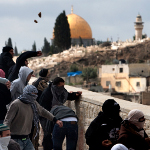Following a rash of Palestinian demonstrations in East Jerusalem and the recent shooting deaths of four young men in the West Bank, it is logical to ask whether we are seeing the beginning of another intifada. While spontaneous unrest is unpredictable, what can be analyzed is whether Palestinian leaders believe another uprising would serve their interests. At this time, this does not seem to be the case.
One indication came in the March 19 khutba (sermon) delivered by Mahmoud Habash, Palestinian Authority (PA) Minister of Social Affairs, who called for “passive resistance,” apparently seeking to forestall the possibility of a third intifada breaking out in response to measures taken by Israel. These include settlement building, confiscation of more Arab properties, the reopening of an Old City synagogue, and other measures in Jerusalem. Habash told Muslim worshippers that “we emulate the Prophet, peace be upon him, who was the first to practice passive resistance and peaceful jihad, and spent 13 years without raising a weapon or ordering a violent response to the harm done to him and his Companions…our people’s interests today require choosing a means of resistance that minimizes losses and realizes achievements.”
President Mahmoud Abbas and Prime Minister Salam Fayyad seem to believe that they scored a political victory by agreeing to U.S.-proposed indirect negotiations just before the outbreak of a rare diplomatic crisis between Israel and the United States. The crisis was precipitated by Israel’s announcement of the approval of 1,600 housing units for Jews in East Jerusalem during Vice President Joseph Biden’s visit Palestinians hope that the confrontation between Israel and the United States will work to their advantage. They believe they now have more sympathy from the United States than at any time since peace talks began in 1991 and do not want to leave Washington’s good books by inciting violence.
But in addition to rising popular anger at the Israelis, PA leaders have another problem with which to contend in attempting to tighten control over the streets: the Hamas leadership in Gaza has been pushing continuously for a third intifada in the West Bank. Abbas and Fayyad are determined to prevent Hamas from inciting widespread violence, which could undo all the economic and security progress they have made in the past three years. Hamas too has limits on how much violence it wants to inspire; there are none of the usual signs of an intifada within Gaza itself and Hamas’ rockets have remained in their launchers.
In addition to their desire to thwart Hamas and preserve the achievements of stability, PA leaders also want to prevent a new uprising because they suspect that Israel is trying to provoke one. They believe that, in reopening an Old City synagogue, which is close to the al-Aqsa Mosque, on March 15, Israel was seeking to goad the Palestinians into renewed violence in order to extricate itself from the diplomatic crisis begun during Biden’s visit the previous week. In contrast to Arafat’s instrumental use of violence during the 1996 riots over tunnels under the Old City and during the Al-Aqsa intifada in 2000, Abbas is proceeding very cautiously in managing the Palestinian street’s reaction to the synagogue’s reopening and other provocations. The PA has clamped down on the areas under its control to stop events from snowballing, or, as the PA political guidance bureau put it, to prevent “a return to the state of chaos and anarchy which prevailed in the Palestinian Territories for years after the second intifada broke out in 2000.”
Although Hamas leaders have been inciting unrest in Jerusalem and the West Bank partly to antagonize the PA, ultimately they and other Palestinian opposition factions understand how difficult it would be to conduct a third intifada while Fatah and Hamas remain divided. Indeed, Hamas’ refusal to sign the Egyptian-proposed reconciliation deal so far has bolstered the PA’s insistence on pursuing diplomacy, because a potential third intifada with a fragmented leadership is too dangerous to contemplate.
Thus far, demonstrations and clashes have taken place primarily in areas not under the control of PA security forces, such as the Old City of Jerusalem and the Qalandia Refugee Camp (near the Israeli military checkpoint between Jerusalem and Ramallah). Tensions have been mounting in these areas due to specific pressures being exerted by the Israeli authorities on Palestinian Jerusalemites. Even in these incidents, a tone of restraint was noticeable. For instance, when nationalist and Islamist forces in Jerusalem met to discuss how to react to the Israeli measures, they chose merely to close down shops for two hours.
Meanwhile, another internal struggle looms in the coming months. The PA recently announced local and municipal elections to be held on July 17 in the West Bank, despite the predictable opposition voiced by Hamas. Although Hamas will officially not be on the ballots, it is expected to put up a challenge in the elections through clan leaders, who will be Fatah’s main competitors.
Hossam Ezzedine is a Palestinian journalist living in Ramallah and specializing in political and parliamentary affairs and sociology. Paul Wulfsberg translated this article from Arabic.






